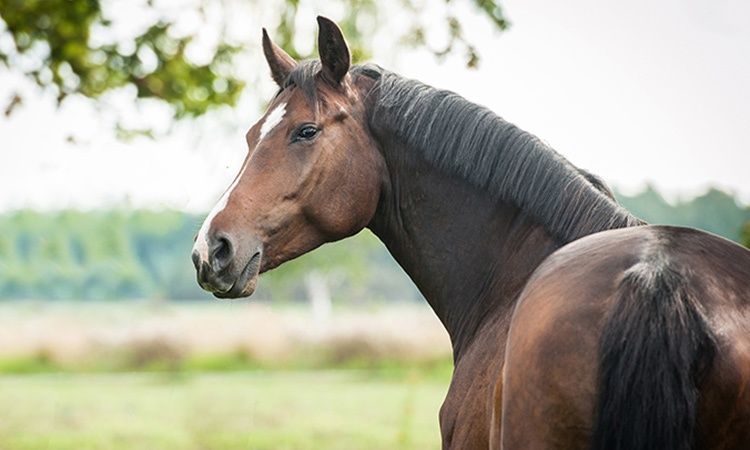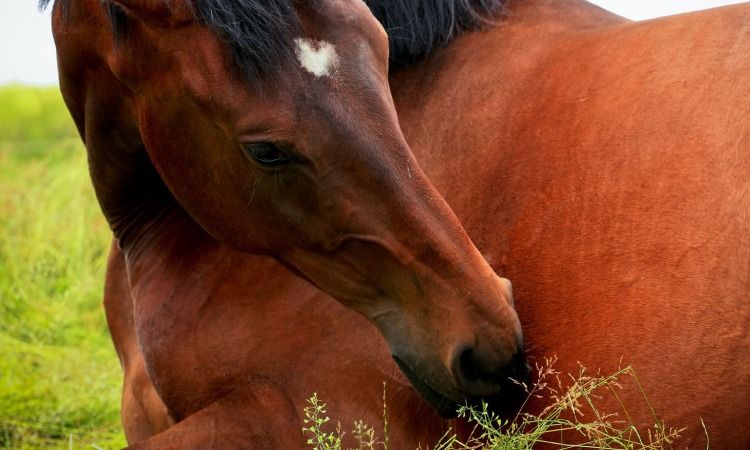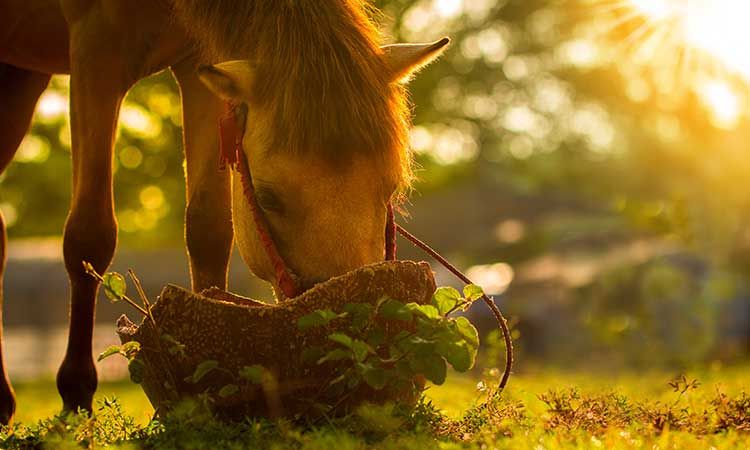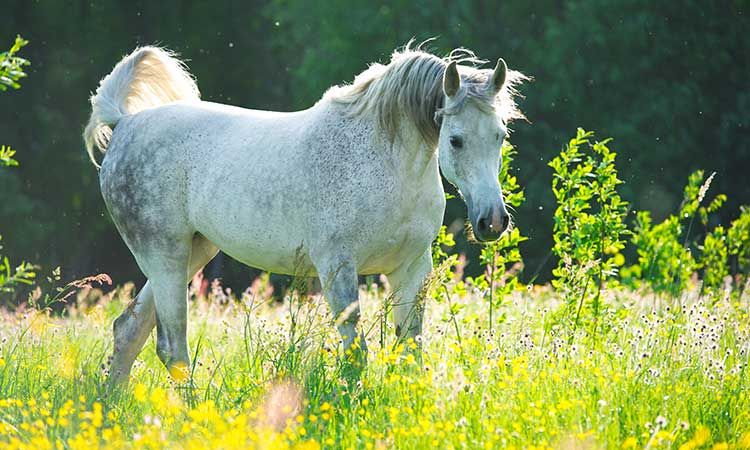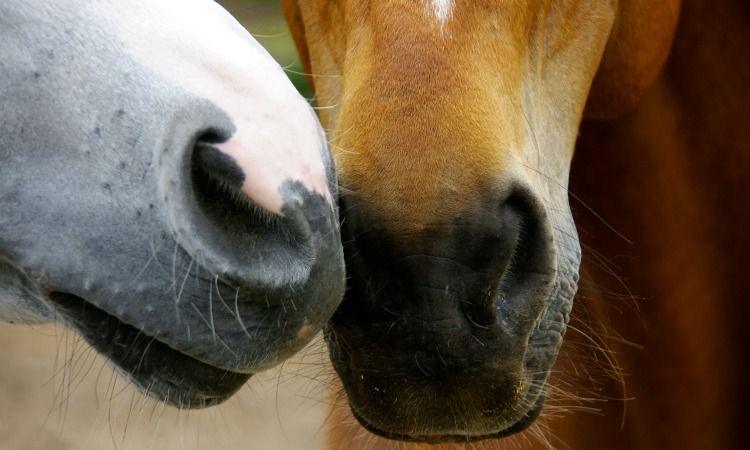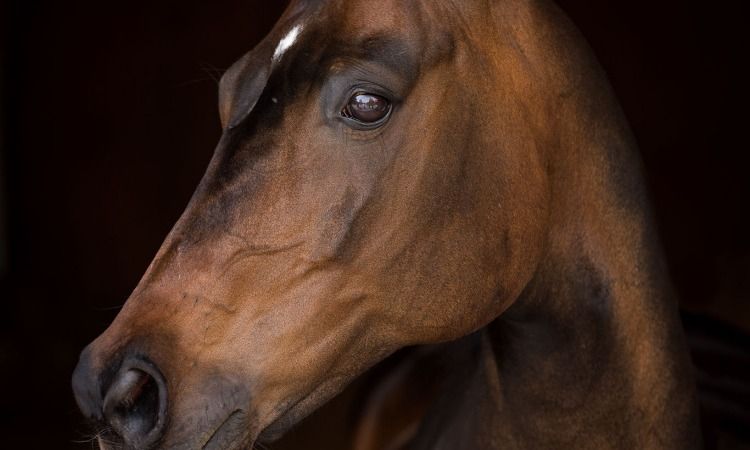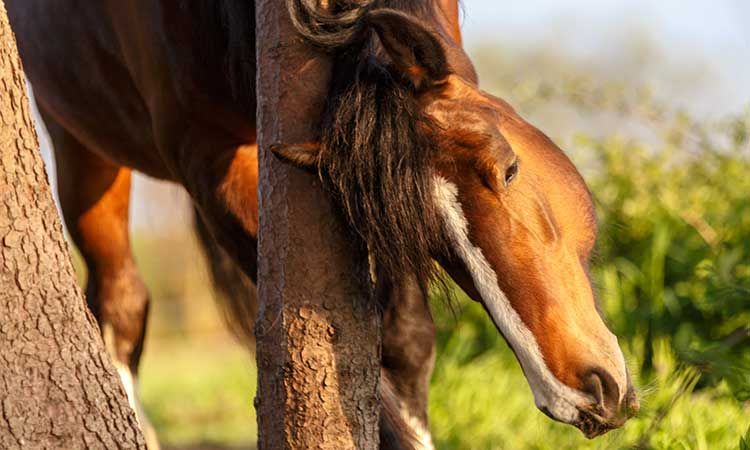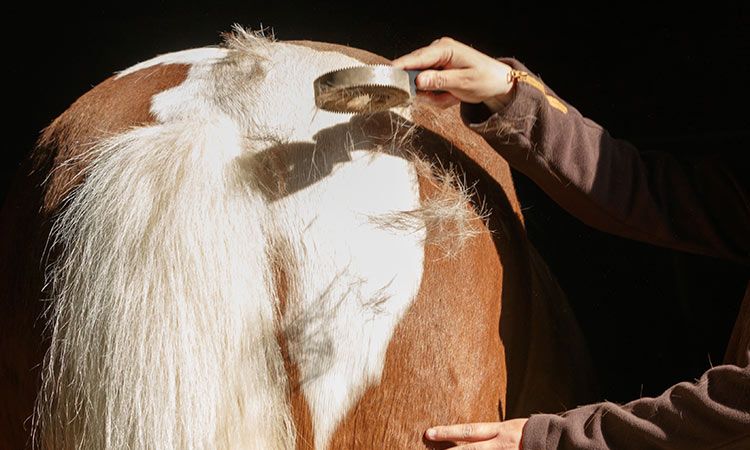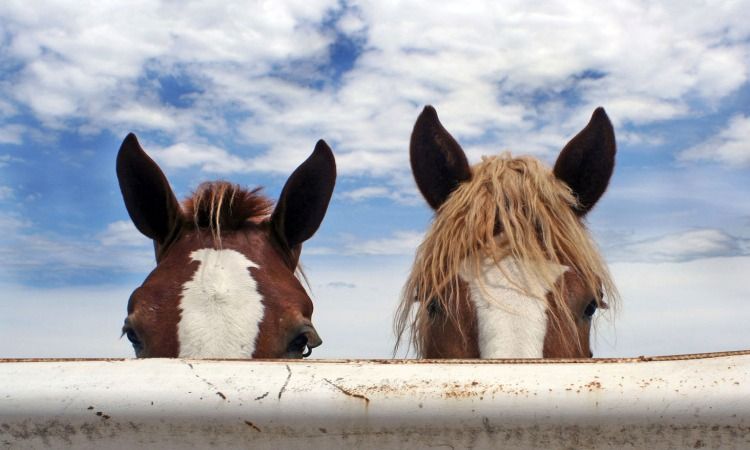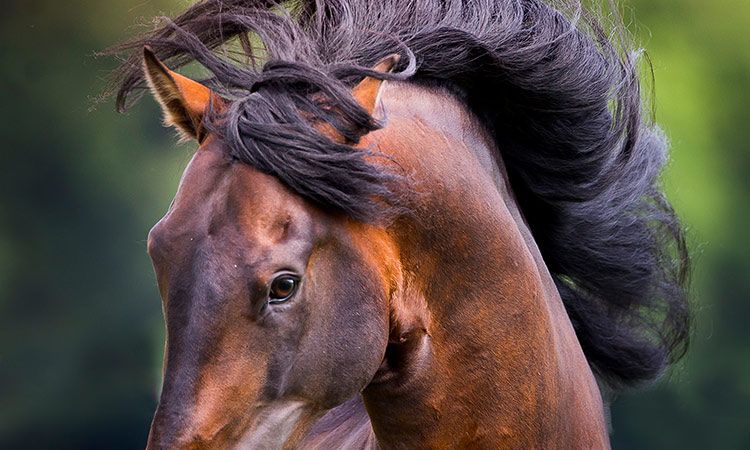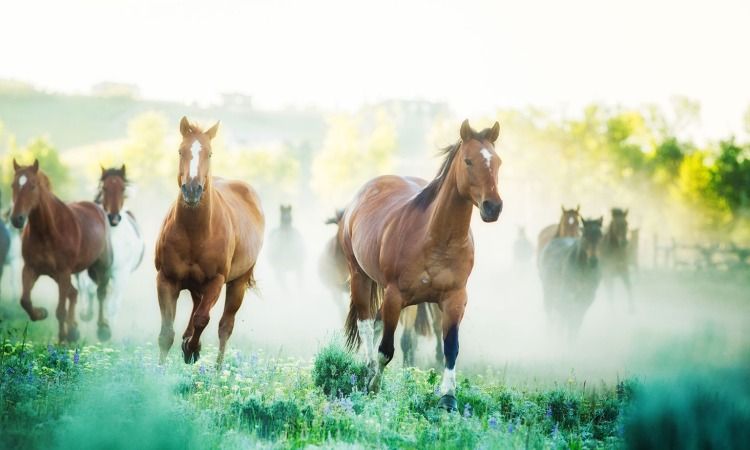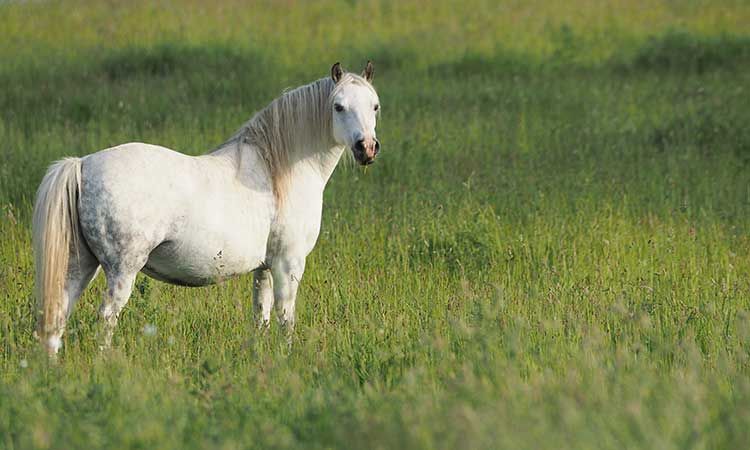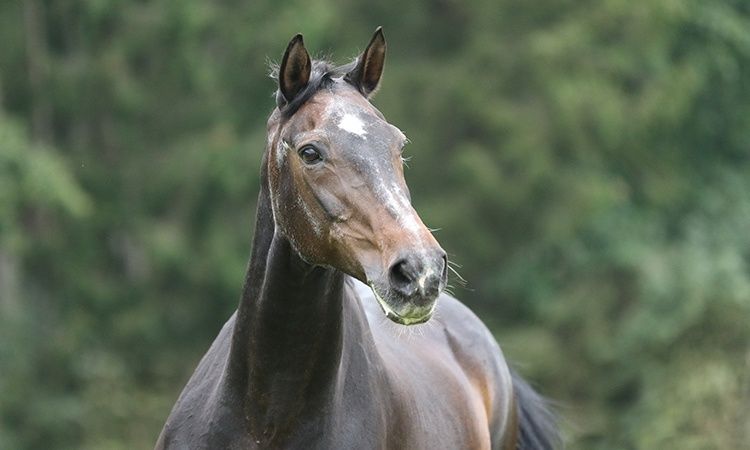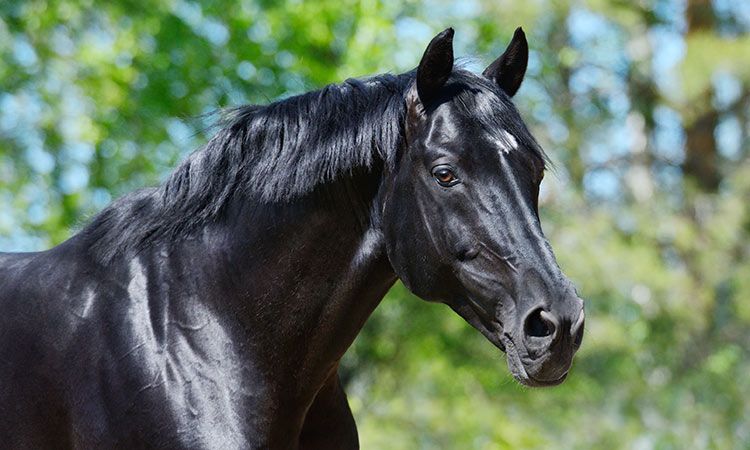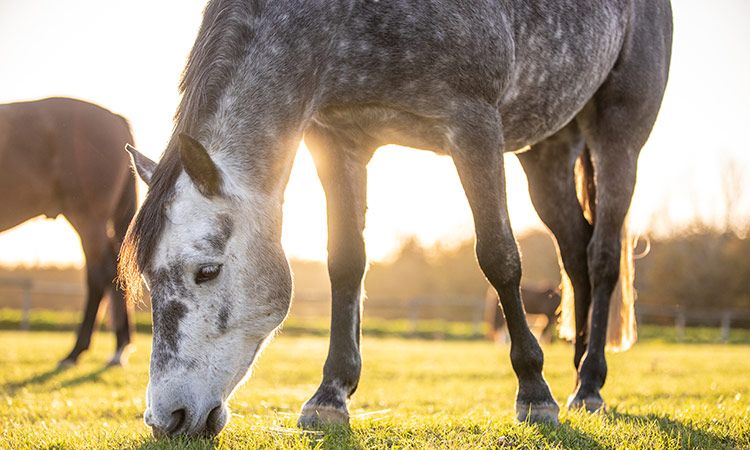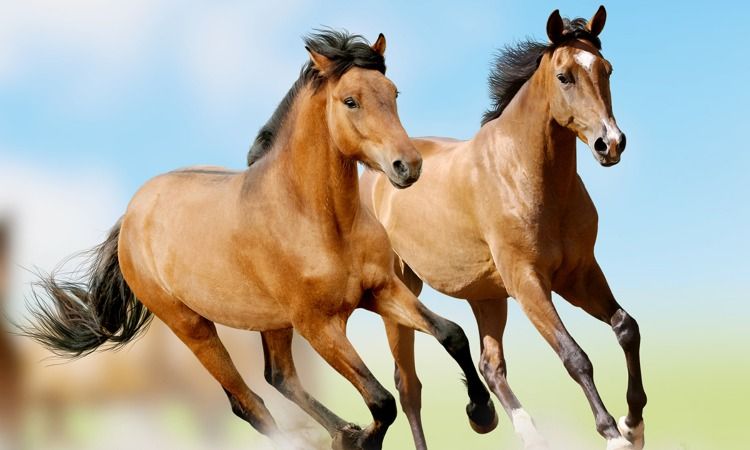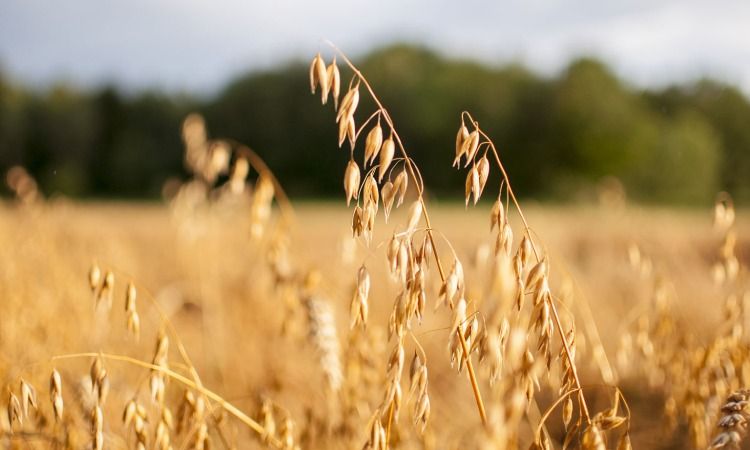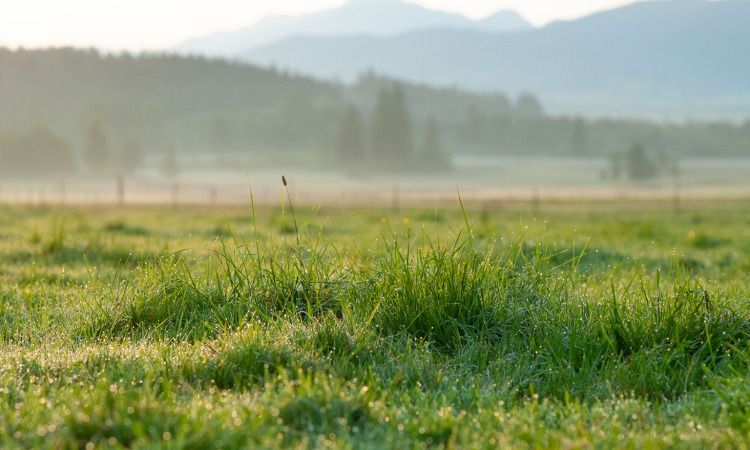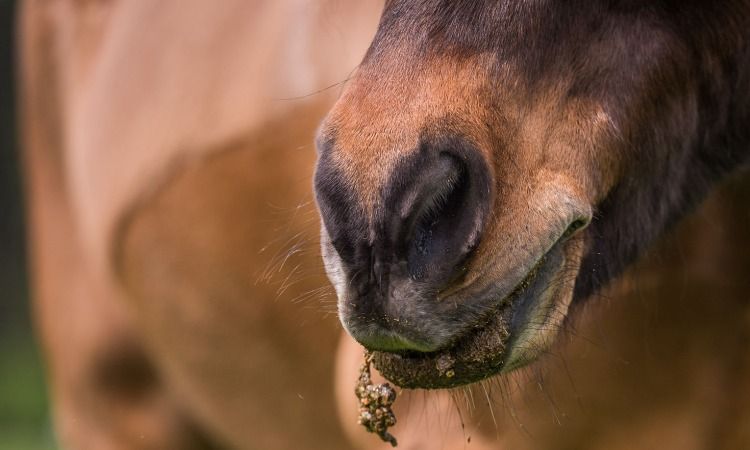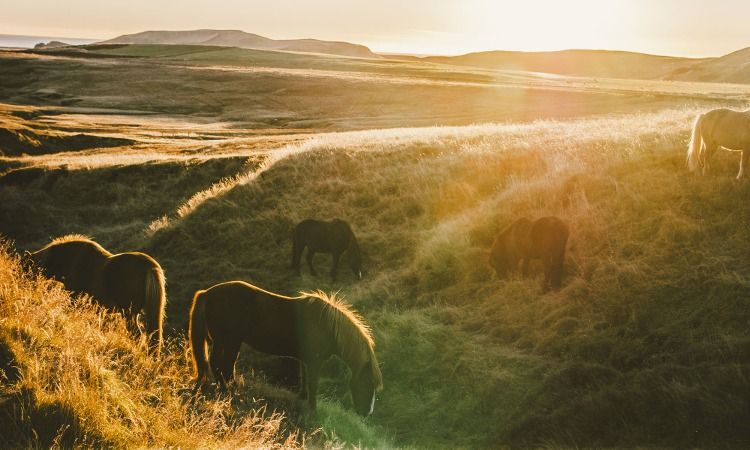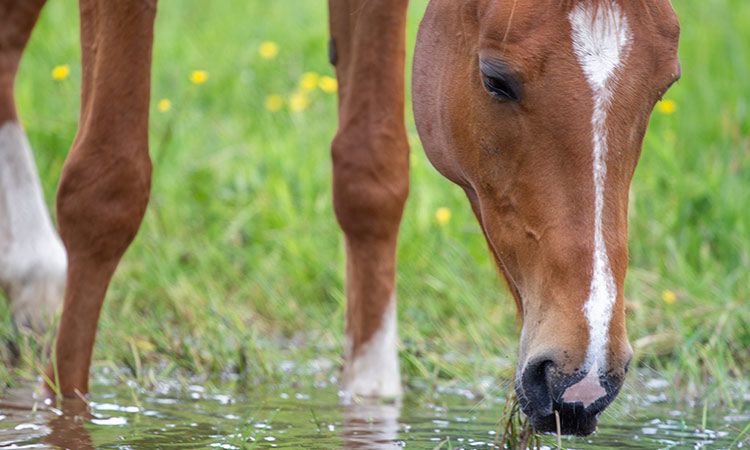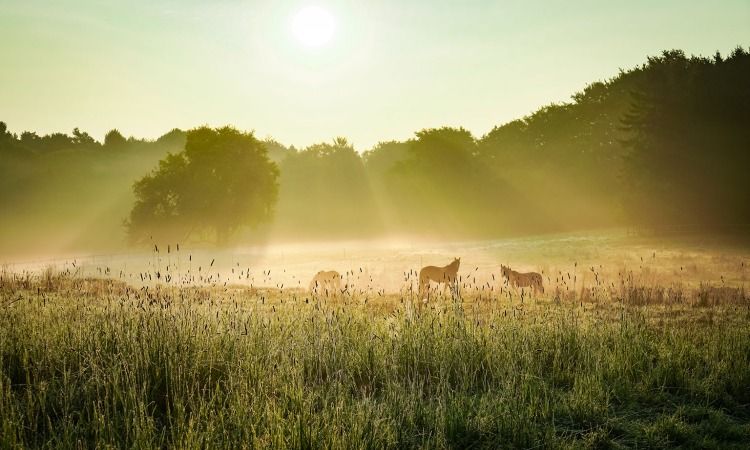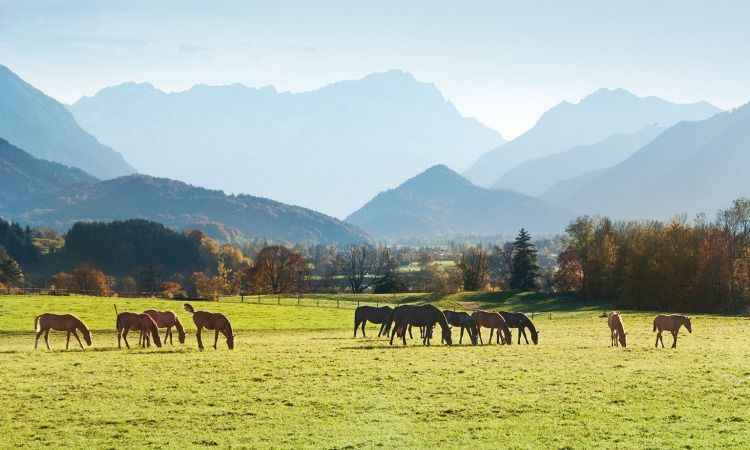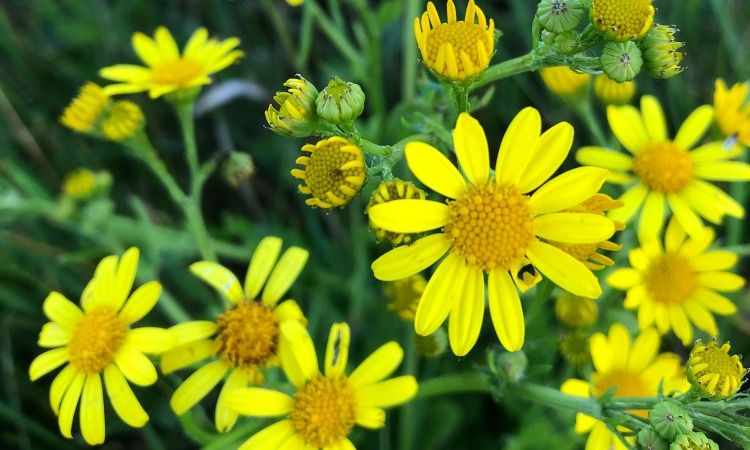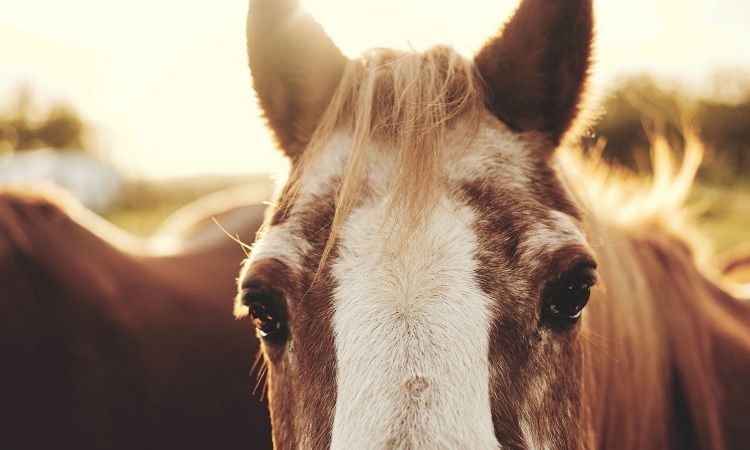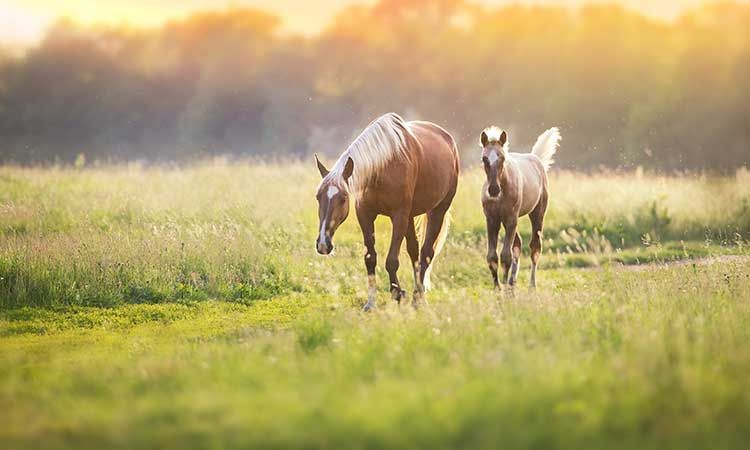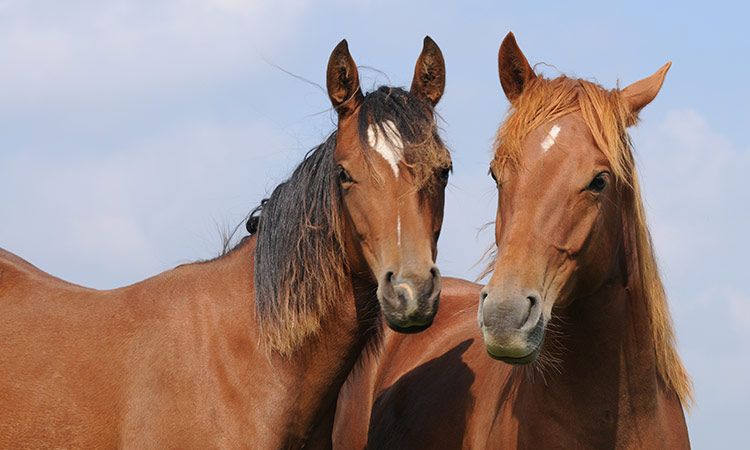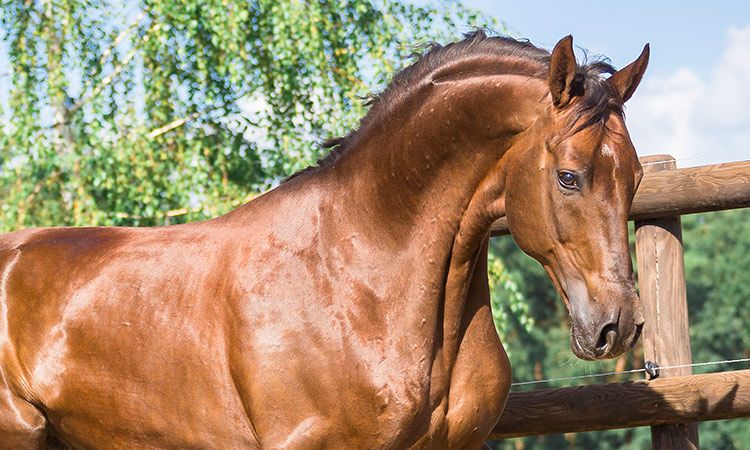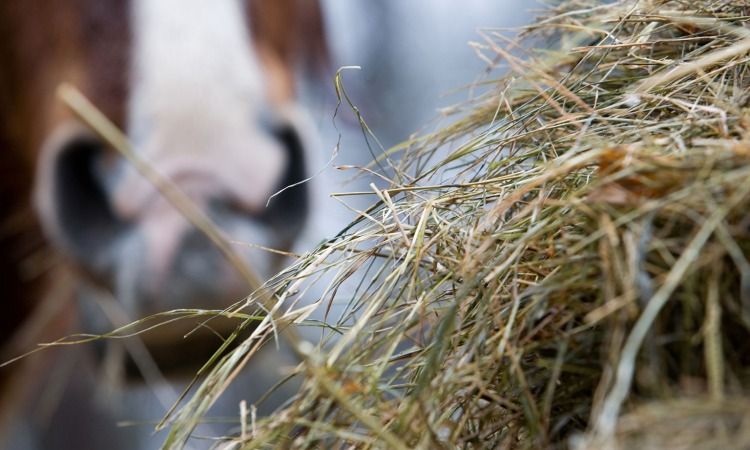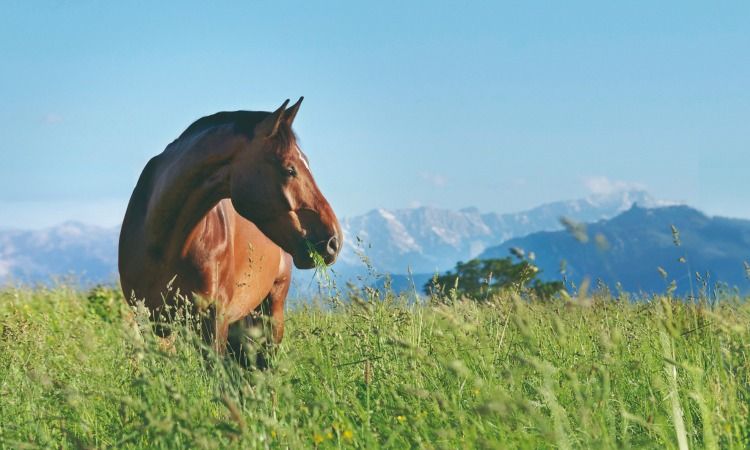Questions and answers on feeding horses
You have questions about the basics of horse feeding and are looking for the right feed for your horse? On this page you will find the most important answers about the natural and healthy feeding of horses. Use the marked points to go directly to the respective topic.You have further questions? At the end of this page you will find all information about our feeding advice from our equine nutritionists.
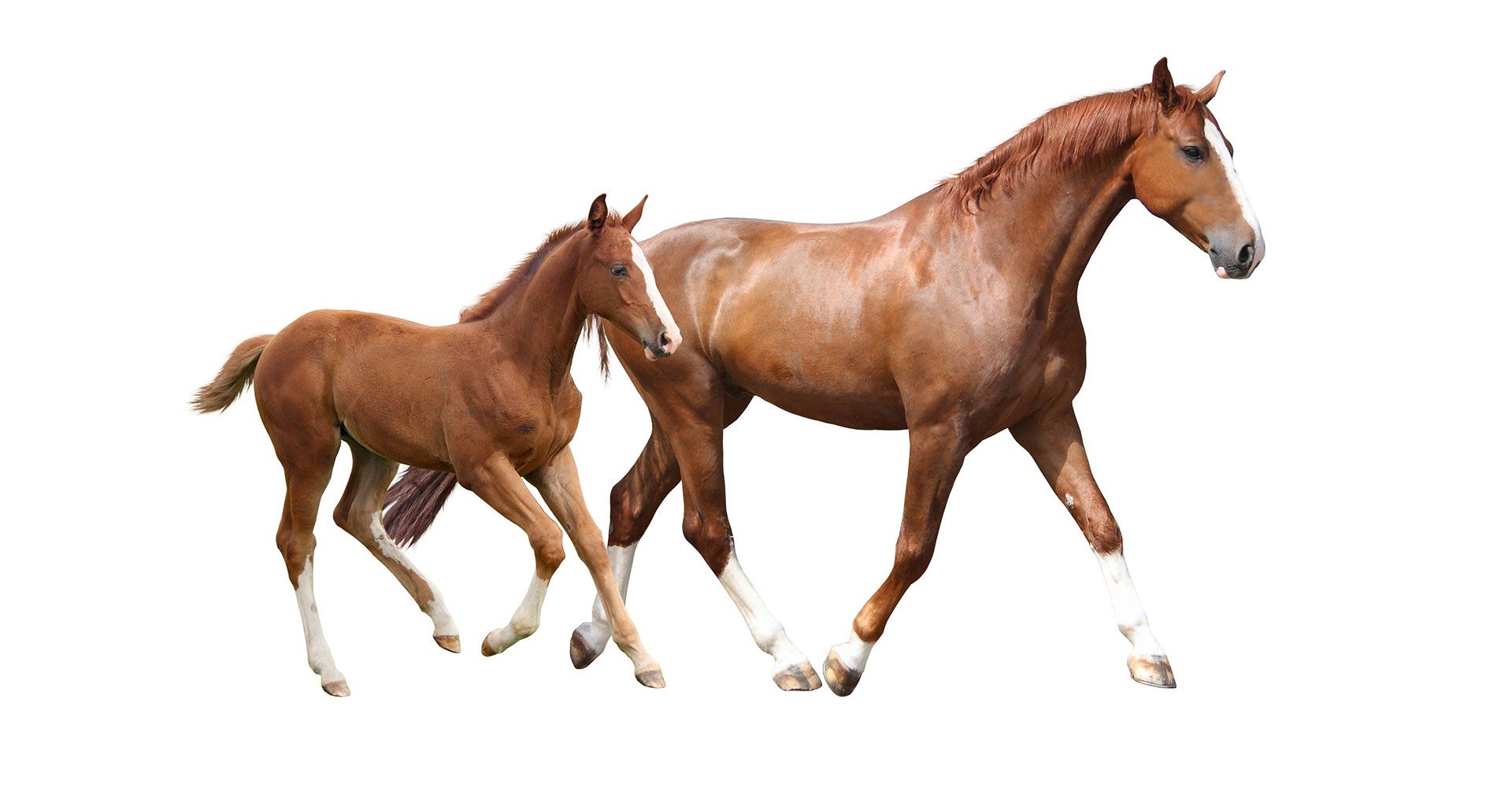
Questions and answers on teeth
Info on horse pastures and their care
Info on proper equine diet in all life stages
Questions & answers on hooves and coat
Question & answers on the immune system
Questions & answers on digestion
Question & answers on metabolic disorders
Questions and answers on the subject of liver
Questions & answers on hooves and coat
Question & answers on energy and nutrients
Info on proper equine diet
Questions & answers for respiratory problems
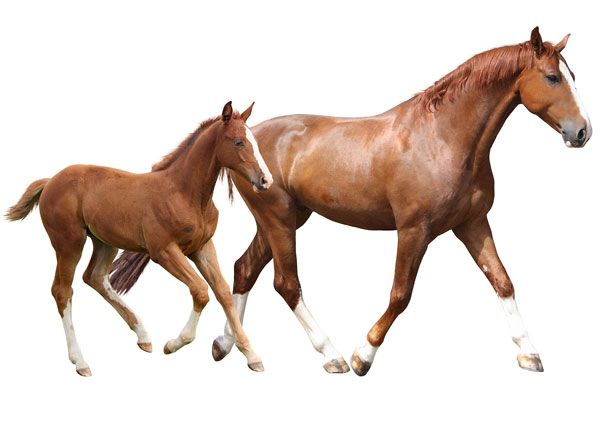
Question & answers on the immune system
Info on proper equine diet
Questions and answers on the subject of liver and kidney
Questions & answers on digestion
Question & answers on metabolic disorders
Question & answers on energy and nutrients
Questions & answers on coat
Questions and answers on teeth
Questions & answers on hooves and coat
Info on proper equine diet in all life stages
Info on horse pastures and their care
Digestion
We recommend feeding your horse AlpenGrün Mash or AlpenGrün Pellet for at least 7–10 days. These products contain Prenatura® fine fibres. These provide nutrients to microbes in the large intestine which are responsible for cellulose breakdown, and effectively bind free faecal water in the intestine. If the roughage quality is poor, our products from the PreAlpin products can ensure the supply of high-quality and easily digestible crude fibre. In addition, Bierhefe Pur (brewer's yeast) can be supplemented as a cure over 4-8 weeks. The prebiotic yeast cell wall components contained in it additionally support digestion.
It is important that your horse be given adequate hay and that long intervals between feeding be avoided. Ad libitum access to feed would be the ideal solution as long as this doesn't cause the horse to gain weight. Pre Alpin® Wiesencobs or Pre Alpin® Wiesenflakes can be used to supplement forage if necessary. Chaff is unsuitable as it can cause additional irritation to the stomach under certain circumstances. Furthermore, it is advised that cereals be avoided completely, at least until the horse has recovered.
Instead, replace concentrate feed rations with Spitzenreiter Magenmüsli, AlpenGrün Mash or AlpenGrün Pellet, as both are very gentle on the stomach. They provide natural mucilage, a high crude fibre content and are starch-reduced. Beet pulp, oil and linseed also make good supplements. In addition to an adapted feed, the supply of magnesium can also play an important role for horses with sensitive stomachs. Magnesium Pur supports the nervous system and helps reduce stress-related stomach issues.
If the correct dosage is given, magnesium will not cause digestive problems in most horses. Diarrhoea can occur in sensitive horses or in cases of overdose. Slowly increasing the amount fed and choosing digestible magnesium compounds can prevent these kinds of problems.
Matching AGROBS topics
Liver
Causes may include general faulty diet, poor quality roughage, or poisonous plants (ragwort).
Horses with liver problems should be fed low-protein feeds. Pre Alpin® Protein, Light Flakes and Maiscobs are a good supplement for underweight horses. Avoid oats and barley, but low-protein maize is a suitable energy source for horses with liver problems. Oil and feeds with high-quality amino acids likewise make suitable supplements.
You can also support your horse's liver with herbs like milk thistle or artichoke. Herbs for the liver.
Although hypermagnesemia (excess magnesium in the blood) is very rare in horses because excess magnesium is excreted via the kidneys, you should only add magnesium to your horse’s diet after talking to your vet, especially if your horse has an impaired renal function.
Symptoms of severe excess magnesium are: muscle weakness, digestive problems such as diarrhoea or loose droppings, lethargy and slow reactions.
Matching AGROBS topics
Teeth
Hooves and coat
Zink Pur offers a way to help horses with mud fever through feed. Mud fever often occurs during periods of increased nutrient requirements, such as during moulting. Here, the problem is often a zinc deficiency. You can also ensure the supply of amino acids by feeding your horse Amino Pur. Supplementing your horse's feed with OMEGA3 Pur will provide anti-inflammatory omega-3 fatty acids as well as omega-6 fatty acids to support skin metabolism.
Affected horses can benefit from targeted amounts of zinc and omega-3 fatty acids in their feed rations. It is also important to keep the horse at a proper weight, as fat deposits can promote inflammatory processes. Under certain circumstances, a protein-reduced diet can also help to alleviate the symptoms. As a mineral feed, our Seniormineral or our Gipfelstürmer Mineral is suitable due to its higher zinc content.For the skin, coat and immune system, a regimen of one container of Zink Pur may be carried out three times a year. Horses that need concentrates should be given cereal-free feeds, as these help to keep blood sugar levels constant. You can also replace about 200 g of concentrate feed with 50 ml of OMEGA3 Pur for an optimum supply of omega-3 fatty acids.
You can support your horse during the moulting seasons by increasing the mineral content in his feed. Use the upper limit of the feeding recommendation for guidance. Alternatively, you can provide selected micro-nutrients to support moulting by feeding Spurenelemente Pur, Zink Pur, or Amino Pur.
Matching AGROBS topics
Metabolic disorders
Low-carbohydrate feeds are advised with regard to disease-related development of insulin resistance. The horse's ration should be cereal-free, and sugary foods like apples and bananas should be avoided. Adjustments to pasture management should be undertaken, especially in spring and autumn, when grasses may have especially high sugar and fructan levels. In addition, the horse's feed management should always be adapted to its nutritional status. An adequate supply of energy and protein is important to counteract the weight loss that often accompanies Cushing's. In case of increased energy requirements, our Spitzenreiter Magenmüsli as well as our Omega 3 Pur can be supplemented. Our AlpenGrün products are also an alternative if the feed should not contain quite so much energy for the build-up. Our Luzernecobs, Myo Protein Flakes or Amino Pur can ensure the supply of high-quality protein. Overweight horses generally need very little complementary feeds beyond high-quality hay.
Minerals and vitamins are also especially important for metabolism. Seniormineral provides optimum coverage even with increased requirements. As a vital substance concentrate, the Gipfelstürmer Mineral supplies all important micronutrients. A regimen with Spurenelemente Pur two or three times a year is advisable.
putting emphasis on a reduction diet and exercise plan adapted to individual requirements.
First, forage should be reduced to 1.5 kg per 100 kg of the horse's target body weight. The hay can also be soaked in water to flush out water-soluble carbohydrates, if necessary. This may accelerate microbial spoilage, however, depending on the ambient temperature. Low-energy straw can also be used to replace 1–2 kg of hay. Check the barrel circumference weekly to ensure that the horse is not losing weight too quickly, otherwise there is a risk of hyperlipidaemia, a fat metabolism disorder.
If the horse shows no lameness and is able to bear weight, 30 minutes of trot and canter work included in the exercise plan at least three to five times a week will help to improve insulin sensitivity.
Under no circumstances should the horse be fed high-energy concentrate feeds containing cereals.
Seniormineral is not only suitable for old horses, is also an ideal mineral feed for horses with increased mineral requirements, as is the case with malfunctioning metabolisms.
Amino Pur has essential amino acids to help maintain as much muscle mass as possible on a reduced-feed diet. Among other things, the Gipfelstürmer Mineral is also suitable as a mineral feed, which as a vital substance concentrate provides all the important micronutrients for powerful muscles. In addition to the protein building blocks methionine, lysine and threonine, it also contains L-carnitine, high levels of selenium and vitamins E, B1, B2 and C ensure a sufficient supply in all situations.
Since magnesium plays a central role in metabolism and can improve insulin sensitivity, supplementing with Magnesium Pur could provide additional support.
Carriers of the gene can usually be helped through adaptations to diet and general management, allowing them to live symptom-free. In this context, our AlpenGrün products and the Spitzenreiter Magenmüsli for example, come into question. These adaptations may include an open stable to allow the horse continuous, slow movement. In winter, however, EPSSM horses should wear rugs to protect the back and croup muscles and always have access to shelter. The horse's diet should be as cereal-free as possible to keep starch intake low and maintain stable blood sugar levels. Supplementing your horse's feed with high-quality protein like our Myo Protein Flakes, Luzerne+, and Luzernecobs will help to prevent loss of muscle tone. We also recommend Amino Pur, which contains essential amino acids that are especially important for musculature. Oil can also provide active sport horses with sufficient energy without adding more carbohydrates to their rations. As a mineral feed, Seniormineral or Gipfelstürmer Mineral is also suitable here, which provide higher levels of amino acids, vitamin E and selenium than Naturmineral.
Since magnesium also plays a central role in muscle metabolism, targeted supplementation with Magnesium Pur can help promote muscle health and provide PSSM horses with greater well-being in their daily lives.
Horses with laminitis should be fed low-carbohydrate feed rations to avoid high insulin secretion. This can be done by eliminating cereals (including products containing rice) from the ration. Hay that is high in sugar can be soaked in water to flush out the water-soluble sugars. It is important that the hay not be simply made wet, but that it be thoroughly washed over a period lasting at least 30, ideally 60 minutes. Overweight horses must lose weight so that they do not contract laminitis again. Here, it is recommended that the horse's daily hay ration be weighed.
The horse's mineral feed should contain more than the required zinc and vitamin E. To ensure the supply of all vital micronutrients, we recommend supplementing Seniormineral or Gipfelstürmer Mineral, which contains more zinc and vitamin E as well as essential amino acids. Underweight laminitis horses (for example those with Cushing's) will benefit from oil (such as OMEGA3 Pur) as a sure source of energy that's carbohydrate-free.
Matching AGROBS topics
The immune system
Matching AGROBS topics
Energy and nutrients
We recommend our Seniormineral for building muscle in younger horses as well, as it contains more essential amino acids, vitamin E, and selenium than our other mineral feeds. Magnesium also plays a crucial role in muscle metabolism. It is important for muscle relaxation, nerve function, and energy production in the cells. Supplementing with Magnesium Pur can therefore effectively support muscle development.
A magnesium deficiency doesn’t always show up in blood test results. Magnesium in the blood only makes up around 1% of the total magnesium in the body because magnesium is mostly stored in the bones and cells. The magnesium concentration in the blood can remain stable for a long time, even if there is a deficiency in the tissues.
Blood tests are of limited use when it comes to diagnosing magnesium deficiency. Abnormally low values confirm a deficiency, but normal values don’t rule it out. Alternatively, measurements of magnesium in whole blood or in the red corpuscles (erythrocytes) can be useful because they more accurately reflect the cellular magnesium status.
If you suspect a magnesium deficiency, you should look at the symptoms, feeding and alternative tests. If you are unsure, you should talk to your vet about what would be the best thing to do for your horse.
Matching AGROBS topics
Horse pastures and their care
Matching AGROBS topics
Proper equine diet in all life stages
In addition, sufficient mineralization is important to guarantee the supply of all vital nutrients. Seniormineral or Gipfelstürmer Mineral are suitable here, as they have higher contents and additionally contain vitamin C. This ensures that the horse gets enough vitamins even when it can no longer synthesise sufficient amounts.
Supplementing the ration with magnesium can strengthen the heart and circulation. Senior horses, in particular, with circulatory fluctuations, weather sensitivity, and swollen legs, can benefit from the administration of Magnesium Pur.
Any high-fibre and high-energy feeds are suitable as concentrates, for example AlpenGrün Mash, AlpenGrün Pellet, Horse Alpin® Senior and AlpenGrün Seniormüsli. Otherwise healthy older horses that are experiencing loss of muscle tone should be given a high-protein feed such as Myo Protein Flakes. If the old horses still have intact teeth, the tasty Spitzenreiter Magenmüsli can help to maintain their substance and muscles. Senior horses that are underweight can also get additional energy from oil, such as our OMEGA3 Pur.
Luzerne+, Luzernecobs or Horse Alpin® Senior will meet this increased need. Haferwiese Sportmüsli is also ideal for broodmares.
In the last third of pregnancy, the mare's magnesium requirement also increases to optimally support the growing foal. Adapted feeding with sufficient magnesium (e.g., through the supplementation of Magnesium Pur) can help prevent deficiencies.
It is important that growing horses not be fed excess energy. Studies show that fast-growing foals are often afflicted with OCD (osteochondrosis dissecans, or "bone chips") later in life. An adequate mineral supply is also important to provide a growing body with sufficient macro-nutrients and micro-nutrients. Well suited here is, for example, our Seniormineral or our Gipfelstürmer Mineral.
Foals being weaned from their mothers will benefit from the addition of AlpenGrün Mash and cooked linseed to their ration. Many foals in the weaning stages develop stomach ulcers due to increased stress. They should therefore be acclimated to the new feed before being completely weaned.
If hay alone does not suffice to maintain weight, the horse will need to be given concentrates.
Haferwiese Sportmüsli supplies sufficient energy for high performance demands and stimulates thorough chewing of concentrate feed. If you want to provide the same amount of energy via a grain-free feed that is also easy on the stomach and does not make the horse too temperamental, Spitzenreiter Magenmüsli is the first choice.
Maiscobs can supplement the rations of horses that work hard and need quite large amounts of feed. Maiscobs are very low-protein and can thus counteract excess protein from large quantities of feed.
Horses with high endurance requirements, such as those in endurance riding, will benefit from feeds with a high crude fibre content such as Spitzenreiter Magenmüsli, AlpenGrün Pellet or Maiscobs, as these provide continuous energy over several hours.
Supplementing rations with Amino Pur will offer targeted support to muscle development.
Additionally, sufficient magnesium intake should be ensured, as magnesium plays a crucial role in muscle relaxation and stress resistance. Especially under high physical strain, the body's magnesium requirement may increase. Targeted supplementation with Magnesium Pur is recommended to prevent muscle tension and support recovery after training.
As a mineral feed, the Seniormineral or the Gipfelstürmer Mineral is suitable for all sport horses. It contains nutrients important for muscles, including essential amino acids, vitamin E, and selenium.
Matching AGROBS topics
Proper equine diet
A horse's daily forage requirement is between 1.5 kg and 2 kg of hay per 100 kg of its target body weight. If it is not possible to provide sufficient forage due to any circumstances, supplement the horse's hay ration with Pre Alpin® products. Pre Alpin® products are hay replacers, meaning that 1 kg of Pre Alpin® can be used to replace 1 kg of hay.
If a mineral deficiency is suspected, a ration calculation may be in order to help compensate for any deficiencies (e.g. through our Naturmineral or Seniormineral).
Most horses doing easy work (1–1.5 rides per day) can get by without concentrate feeds. Overweight horses do not need any high-energy concentrates, even with daily work. A small amount of soaked Pre Alpin® Wiesenflakes, Leichtgenuss or Grünhafer for example, is a suitable mineral feed supplement. Seniormineral has an increased micro-nutrient content that can compensate for mineral and vitamin deficiencies due to diet.
The basis of any good equine diet is high-quality hay.
Depending on the breed, a horse's daily forage requirement is between 1.5 kg and 2 kg of hay per 100 kg of its target body weight. A warmblood weighing 600 kg will need between 9 and 12 kg per day. The higher number should always be selected if the horse is underweight. The horse can also be given ad libitum access to hay. If the amount of forage is not sufficient, increasing the amount of concentrate feed will not help.
If feeding the horse more hay is not possible, the Pre Alpin® line offers a number of alternatives. For all Pre Alpin® products, the following applies: 1 kg of Pre Alpin® replaces 1 kg of hay.
You can also supplement the ration with AlpenGrün Mash or AlpenGrün Pellet. Both are restorative and gentle on the stomach, as they contain more "calories" than hay. The Spitzenreiter Magenmüsli from our range is particularly ‘high-calorie’ and at the same time grain-free, stomach-friendly and very tasty. High-quality vegetable oils also make good supplements.
Horses require sufficient crude fibre to maintain healthy digestion and to satisfy the horse's need to chew. As descendants of animals that once grazed the steppes, horses are built to cover their energy and nutritional requirements almost exclusively through forage.
As a guideline, one can use a general rule of thumb for calculating a horse's forage requirement: depending on the breed, between 1.5 kg and 2 kg of hay per 100 kg of its target body weight.
If the daily hay ration is inadequate or of poor quality, use Pre Alpin® products as a wholesome hay substitute or supplement. Dry Pre Alpin® feed products like AlpenHeu, Pre Alpin® Aspero, and Pre Alpin® Compact are suitable for horses with healthy teeth, whilst products in cob or flake form for soaking are also suitable for horses with dental issues.
There are a few questions to be asked if a horse is too hot-blooded: Is the horse stabled in a loose box or an open stable? Many horses are happier being able to move about in an open stall, whilst others experience stress from always being in a group.
How much exercise does the horse get? Is your horse adequately challenged, both physically and mentally?
With regard to feed, consider how much concentrate feed the horse is getting and whether he even needs it. As descendants of animals that once grazed the steppes, horses are built to cover their energy and nutritional requirements almost exclusively through forage. Supplement your hot-blooded horse's feed with cereal-free, low-carbohydrate complementary feeds if he needs additional concentrate feed to maintain a healthy weight. Unlike cereals or other high-carbohydrate feeds, these won't significantly elevate blood sugar levels and "go to his head". AlpenGrün Müsli and AlpenGrün Pellet are good, cereal-free concentrate feed alternatives that, in combination with oil (OMEGA3 Pur), supply sufficient energy for work. If you want an even higher energy density for daily work but still don't want the horse to be too lively because it is based on fat and fibre instead of cereals, the Spitzenreiter Magenmüsli is a good choice.
Since a magnesium deficiency can also manifest as nervousness and increased skittishness, targeted magnesium supplementation with Magnesium Pur could be beneficial.
The idea of feeding the horse high quantities of cereals to provide more energy is often unproductive. The digestive system will have problems digesting large amounts of cereals, and if a horse is maintaining its weight, the cause of his lethargy will not be from getting too little energy.
Instead, the first important step is to ensure that he is getting enough good-quality forage. After that, if the horse is losing weight, you can raise the energy level by adding a concentrate feed to the ration.
Use a concentrate with or without cereals depending on need: Haferwiese Sportmüsli, Spitzenreiter Magenmüsli, AlpenGrün Müsli, or AlpenGrün Pellet. Older horses in particular can also be given herbs for health and/or hawthorn. Nutritional deficiencies can also trigger lethargy in horses, which is why it's important to see that your horse is getting the minerals he needs. For this purpose, there is Naturmineral, Gipfelstürmer Mineral or Seniormineral for horses with higher needs. For the pasture season, Weidemineral-Cobs are suitable.
If the horse refuses its feed, offer it products from the Pre Alpin® line. AlpenGrün Mash and AlpenGrün Pellet are delicious concentrate variants/supplements – they are easy on the digestive system and horses love them. They are especially suitable for horses with stomach or intestinal issues.
If that doesn't help, try to stimulate your horse's appetite with cereal flakes, apple juice, apple sauce, or carrot juice.
Unfamiliar tastes, for example from new feeds, can lead to poor feed intake as well. Introduce any new feeds slowly and in small amounts, gradually increasing them to accustom the horse to the new feed.
Respiratory problems
Since magnesium plays an important role in the relaxation of smooth muscles — including the bronchi — a balanced magnesium level can help the airways relax, making breathing easier for the horse. Targeted supplementation with Magnesium Pur can support adequate magnesium intake and promote the horse’s well-being.
Your question is not included? Our Equine Nutrition Advice Team will be happy to help you!
If you have not found the answers to your questions, please contact us via our individual feed advice form.Here you have the possibility to describe your problems in detail. We will be happy to advise you.
Go to feeding advice




